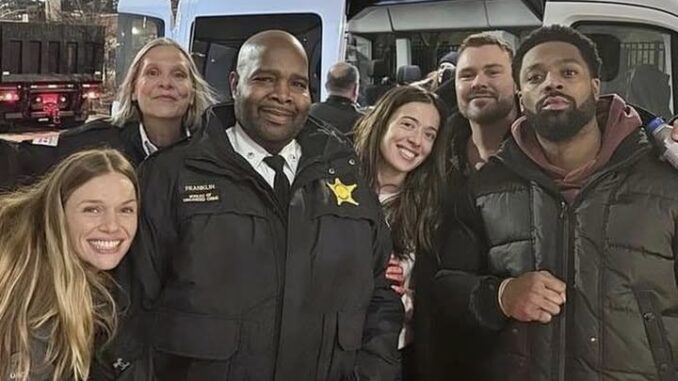
When the cameras stop rolling on NBC’s intense police drama “Chicago P.D.,” the actors who bring the Intelligence Unit to life step away from the gritty streets of fictional Chicago into personal lives as fascinating and complex as their on-screen counterparts. For a show built on the premise that the most interesting relationships often develop under pressure, it seems almost poetic that its cast’s romantic journeys reflect a similar depth and complexity—complete with unexpected twists, second chances, and even love stories that blurred the lines between fiction and reality.
The stoic and morally complex Sergeant Hank Voight, portrayed with gravelly intensity by Jason Beghe, presents a stark contrast to the actor’s real-life path. While Voight navigates Chicago’s criminal underworld with hardened determination, Beghe’s personal journey includes a 20-year marriage to Angie Janu that produced two sons before ending in 2017. The dissolution of this long-term relationship coincided with significant personal growth for Beghe, who has spoken candidly about working through challenging periods in his life. Unlike his character who keeps emotions tightly controlled, Beghe has approached his personal evolution with refreshing transparency.
Before his rumored connection with Spiridakos, Soffer’s heart belonged to another Chicago franchise colleague—Sophia Bush, who played Detective Erin Lindsay during the show’s early seasons. Their relationship developed in 2014 as their characters’ on-screen romance became a central storyline, creating a fascinating parallel between scripted and real-world connections. Though their personal relationship ended in 2016 while they were still co-stars (before Bush’s departure from the series in 2017), they maintained professional respect that allowed their characters’ story to continue convincingly—a testament to both actors’ commitment to their craft despite personal complications.
Marina Squerciati, who brings Officer Kim Burgess to life with emotional depth and determination, maintains significantly more privacy around her romantic life than her character does on screen. While Burgess’s relationships with Adam Ruzek and various other characters play out in full view of millions, Squerciati has kept her personal life largely sheltered from public scrutiny. She welcomed a daughter in 2017 but has chosen not to publicly identify her child’s father—a boundary that deserves respect in an industry where personal details often become public property. This protective approach to her private life stands in interesting contrast to her character’s emotionally transparent nature.
:max_bytes(150000):strip_icc():focal(990x153:992x155)/chicago-pd-real-life-loves-jesse-lee-soffer-tracy-spiridakos-ashlyn-harris-sophia-bush-main-split-041625-1a8ffc0ff35c48c2a20e9631b2b20820.jpg)
Patrick John Flueger, whose portrayal of the impulsive but loyal Officer Adam Ruzek has earned him a devoted following, has been linked to Norwegian actress and model Reem Amara since 2018. Their relationship, documented occasionally through affectionate social media posts, offers glimpses into a partnership characterized by travel adventures and mutual support of each other’s career aspirations. This stable, supportive relationship creates an interesting counterpoint to Ruzek’s tumultuous romantic history on the show, particularly his on-again, off-again connection with Burgess.
LaRoyce Hawkins, who brings the principled and community-minded Officer Kevin Atwater to life, approaches his private life with the same thoughtful discretion his character often displays. While Hawkins has mentioned being a father, he carefully protects details about his relationships and family structure. This protective approach allows him to fully inhabit Atwater’s complex storylines about race, policing, and community relationships without public narratives about his personal life influencing viewers’ perceptions of his powerful performances.
Amy Morton, whose Lieutenant Trudy Platt delivers the show’s rare moments of dry humor, has built a distinguished career in Chicago theater alongside her television work. Her long-term marriage to director Rob Milburn represents one of the cast’s most established partnerships. Their connection, built on shared artistic passions and mutual respect, exemplifies the kind of stable foundation that allows for creative risk-taking—perhaps contributing to Morton’s ability to transform what could have been a minor character into an essential part of the show’s emotional ecosystem.
As “Chicago P.D.” continues its compelling exploration of justice, loyalty, and the bonds formed under pressure, viewers might appreciate the additional layer of complexity that comes from understanding the real human beings behind these characters. The cast members’ personal relationships—whether public romances, private partnerships, or independent journeys—inform the emotional authenticity they bring to each episode, creating connections across the screen that feel genuine because, in many ways, they are rooted in life’s most universal experience: the search for meaningful human connection.
